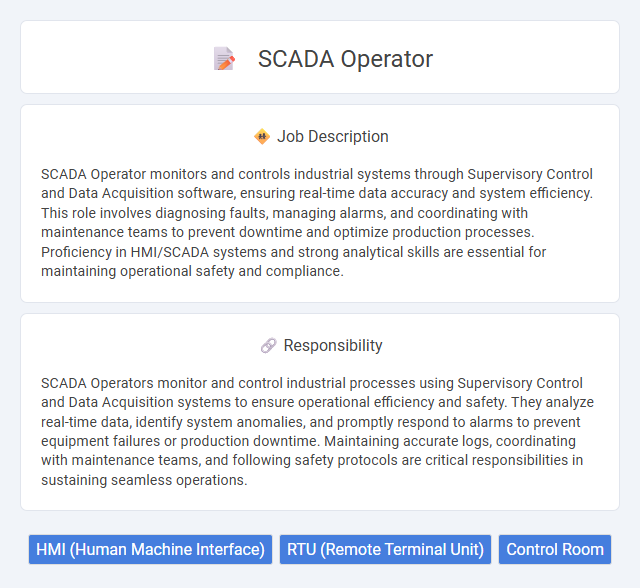
SCADA Operator monitors and controls industrial systems through Supervisory Control and Data Acquisition software, ensuring real-time data accuracy and system efficiency. This role involves diagnosing faults, managing alarms, and coordinating with maintenance teams to prevent downtime and optimize production processes. Proficiency in HMI/SCADA systems and strong analytical skills are essential for maintaining operational safety and compliance.
Individuals with strong analytical skills and attention to detail are likely suitable for a SCADA operator role, as it requires monitoring and managing complex control systems. Candidates who can remain calm under pressure and possess good problem-solving abilities may have a higher probability of success in this position. Those uncomfortable with shift work or prolonged screen time might find this job less fitting.
Qualification
SCADA operators must possess strong technical knowledge in industrial control systems, including proficiency with SCADA software such as Wonderware, Siemens WinCC, or GE iFIX. Essential qualifications include a background in electrical engineering, automation technology, or a related field, often supported by certifications like ISA Certified Control Systems Technician (CCST). Key skills also involve real-time system monitoring, troubleshooting control network issues, and ensuring compliance with industry safety standards like ISA/IEC 62443.
Responsibility
SCADA Operators monitor and control industrial processes using Supervisory Control and Data Acquisition systems to ensure operational efficiency and safety. They analyze real-time data, identify system anomalies, and promptly respond to alarms to prevent equipment failures or production downtime. Maintaining accurate logs, coordinating with maintenance teams, and following safety protocols are critical responsibilities in sustaining seamless operations.
Benefit
SCADA operators are likely to benefit from enhanced system control and real-time monitoring, which may improve operational efficiency and safety. They could experience reduced downtime and quicker response times to system anomalies due to advanced automation features. This role may also offer opportunities for skill development in industrial control systems and cybersecurity protocols.
Challenge
SCADA operator roles likely involve managing complex industrial systems that require constant vigilance to detect and address anomalies, posing ongoing challenges in maintaining system reliability. The probability of facing real-time decision-making under pressure is high, necessitating strong problem-solving skills and technical expertise. Operators might frequently encounter unexpected system failures or cybersecurity threats, demanding rapid response to minimize downtime and operational risks.
Career Advancement
SCADA Operator roles provide a strong foundation in industrial automation, control systems, and real-time data monitoring essential for advancing into senior positions such as Control Systems Engineer or Automation Specialist. Mastery of SCADA software, PLC programming, and network infrastructure enhances career prospects in industries like utilities, manufacturing, and energy management. Continuous skill development, including cybersecurity and IoT integration, positions SCADA Operators for leadership roles in system optimization and operational technology management.
Key Terms
HMI (Human Machine Interface)
SCADA operators expertly manage Human Machine Interface (HMI) systems to monitor and control industrial processes in real-time, ensuring operational efficiency and safety. They analyze HMI data trends to detect anomalies and initiate corrective actions promptly, minimizing downtime and optimizing system performance. Proficiency in HMI software and communication protocols is essential for seamless interaction between control systems and physical equipment in SCADA environments.
RTU (Remote Terminal Unit)
SCADA operators monitor and control Remote Terminal Units (RTUs) to ensure real-time data acquisition and automated system management across industrial processes. RTUs serve as critical interfaces, collecting data from sensors and transmitting commands to field devices, enabling efficient remote supervision. Proficiency in configuring RTU communication protocols and troubleshooting signal transmission faults is essential for maintaining system integrity and operational continuity.
Control Room
SCADA Operators in control rooms monitor and manage industrial processes using Supervisory Control and Data Acquisition systems, ensuring real-time data analysis and prompt response to system alarms. Their responsibilities include maintaining system integrity, troubleshooting issues, and coordinating with field technicians to optimize operational efficiency and prevent downtime. Proficiency in HMI interfaces, data logging, and adherence to safety protocols is essential for effective control room management.
 kuljobs.com
kuljobs.com